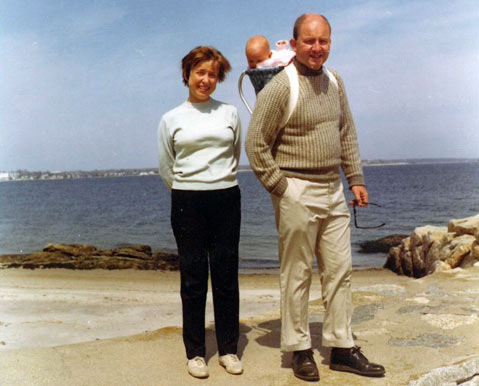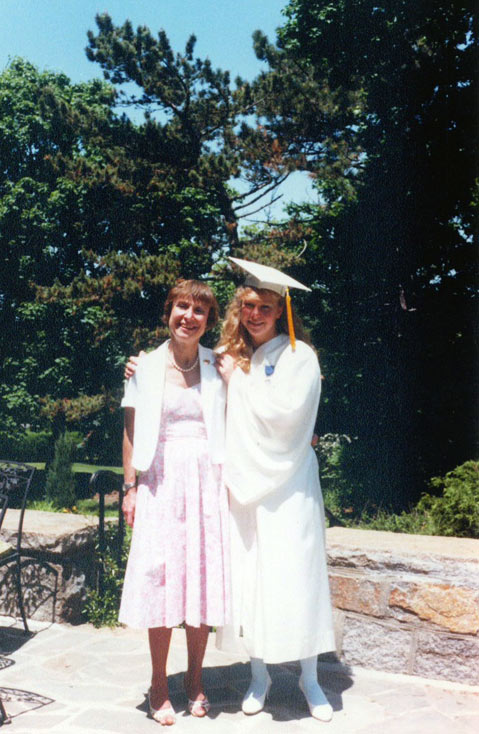Role Mother
Teaching Children Who You Really Are

Much to my surprise, I became a stay-at-home mom, despite the fact that it was in direct conflict with the way I was brought up, my value system, and how I anticipated I would lead my life. This happened a decade ago in San Francisco shortly after I discovered I was pregnant. The dot-com bubble had just burst, and I was laid off from my job at a high-tech company. My then-husband urged me to reconsider my options and not go back to work.
I was insulted and angered by his suggestion. I didn’t want to shut the door on my career. I had an Ivy League education and a fairly impressive résumé. My own mother — one of only eight women in her class at Harvard Medical School — was my role model. Women, smart women, had careers as well as having kids. Overachiever that she was, my mother had had six. I assumed I would just continue the family tradition.
I was even more upset when he suggested we relocate to Santa Barbara. I didn’t want to start motherhood without my cadre of friends, in a new city, no family. Santa Barbara was L.A. as far as I was concerned, and I hated L.A. Who was I going to hang out with — kale-eating Southern California bimbos? It was one of our only big disagreements. But I remembered the tension in my parents’ marriage, as my mom stretched herself between husband, kids, and a demanding career. For me, well, I would try and be open and give the Happy Homemaker path a try.
Since we could afford life without a second paycheck, I decided to get involved with nonprofits in my new town. I needed to keep my brain engaged, and I wanted my children to see the various ways one could participate in the world around them.

It turned out that many of the women I befriended in Santa Barbara also had impressive former lives and educations — doctors, lawyers, corporate executives, writers. These are “stay at home” moms who are anything but. They are the workhorses who power our schools, our charities, volunteering hundreds if not thousands of hours. They are the ones who offer to chair a fundraiser or preside over a board or donate just one more silent-auction item — and they do this time and time again.
Of course, there are mothers who are just too busy with their tennis lessons to have time to read to their children’s classes. But there are also mothers who hold jobs and yet can always be counted on to volunteer. A good friend of mine who runs her own company while chairing the school carnival says she will always work because she wants to show her daughter that one doesn’t need a partner in life just to be financially secure. What I have learned during these last 10 years is that each compromise can either strengthen or weaken us, and it can take years before we realize which one it is.
My moment of truth came when my husband announced he was leaving me. “Perhaps if you had gone back to work, you would be more interesting” was one of the many excuses he gave. I really wanted to kick him in a very interesting spot. Long story short, I had to go back to work. (“Interestingly” enough, it turns out what is enough to support one family is not enough to support two in the Santa Barbara Lifestyle we had become accustomed to.)
My kids reacted to my returning to work in many ways I expected: “I don’t want you to go to work; I want you to be here” and “Why can’t you go on the field trip?” What shocked me were these responses: “Why work? Daddy makes all the money,” “Daddy is a great businessman,” or “You worked? Why?” It turned out my daughters had thought about what they wanted to be when they grew up — pilot, doctor, mom, and rock star. But to them, my life was not much beyond being the taxi driver, party planner, sippy-cup washer — not the view I had of my mom, fighting against convention to be Carol Brady and Marcus Welby, MD.
All my volunteering had meant little to my kids. They didn’t know that I had helped develop their school’s Five-Year Strategic Plan, let alone that I spoke three languages, had a diplomatic passport, traveled around the world, and worked in major technology companies. I had dropped the ball on my mother. In one generation, despite my best intentions, I had brought it all back to Ozzie and Harriet.
I certainly enjoyed my early “retirement” in many ways and realize what a privilege it was. But stepping back from social progress, as many women have done in recent years, often has deeper impacts than we expect. As parents, we work so hard to educate the whole child, driving them to sports, to ballet class, to art and to music lessons, museums, camps — whatever we can afford. But how do we show them the value of social equality or persistence in the face of adversity or other life lessons that can puncture the “bubble” effect we create driving our children around in our safe SUVs?
My mother had been caught in the Wife’s Trifecta — marriage, career, motherhood. Even then, I saw how thin she was stretched. She would be up until 2 a.m., making cookies for a child’s class or reading medical journals. Unfortunately, cancer was her wake-up call, but it gave her the license to finally focus on herself. She published a book of poetry, took up acting, and began lecturing at her alma mater on her firsthand experience of how the doctor/patient relationship impacts healing.
Divorce was my call to action. Now I have the opportunity to show my kids, and myself, who I really am: that Mom can support herself, that Mom can deal with a major change of plans. Now my kids see me going to work and realize that the money I make pays for their hamster, their toys, their cookies, and our dinner. In time, they will also learn that while their father may have whatever business capabilities he was blessed with, Mom was able to land a job with a great company during a down economy, in a town with a relatively small job market, after 10 years of being out of the “official” work force.
It’s challenging not to be with my kids as much as I would like. But I know that I am there in other ways. I know that I value my time with them that much more, and I realize now how much they almost missed out on learning — about me, and more importantly, about themselves. And I too am learning of what I am really made.
If I don’t help my children to believe in their dreams, to lead by example, and to teach them that they are capable of changing the world (no matter in how small a way), then we all lose in the end. My mother did not live to meet my children, but I intend to continue her example of being a Role Mother — to show them that it is possible to achieve many different dreams. That is how I intend to define my own identity and my legacy.



